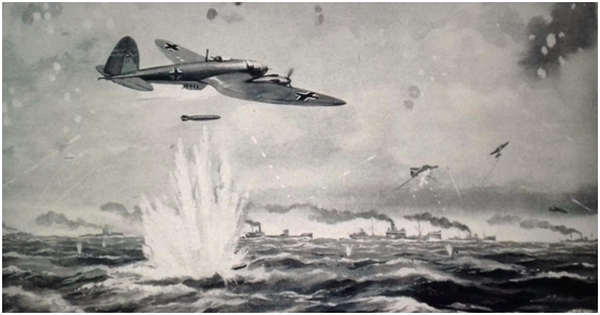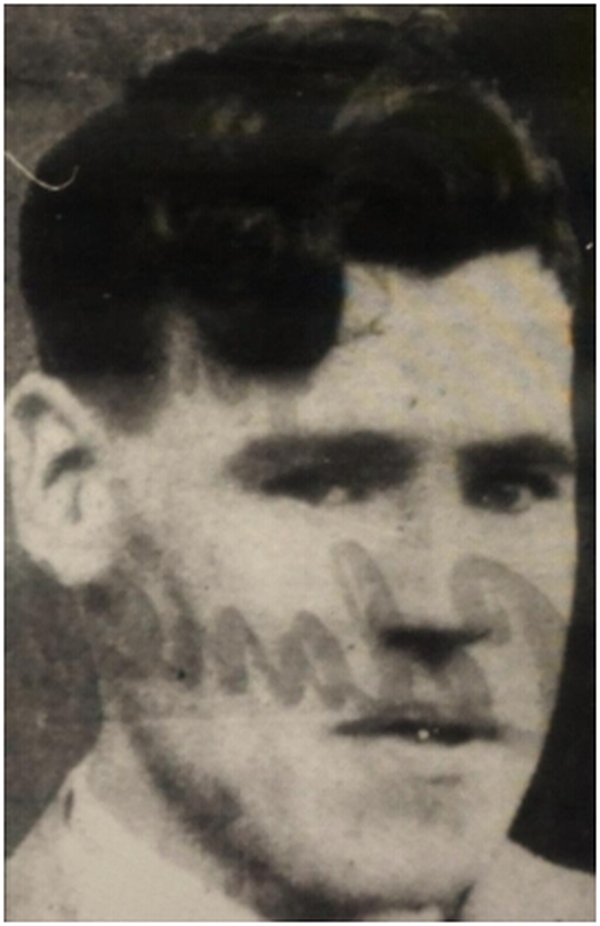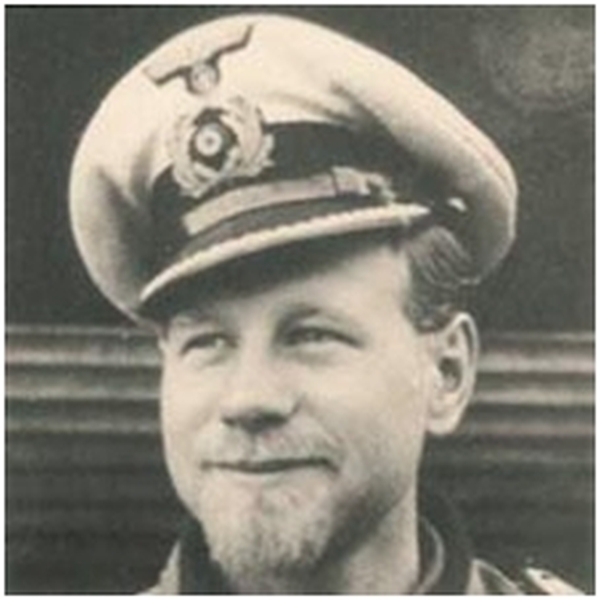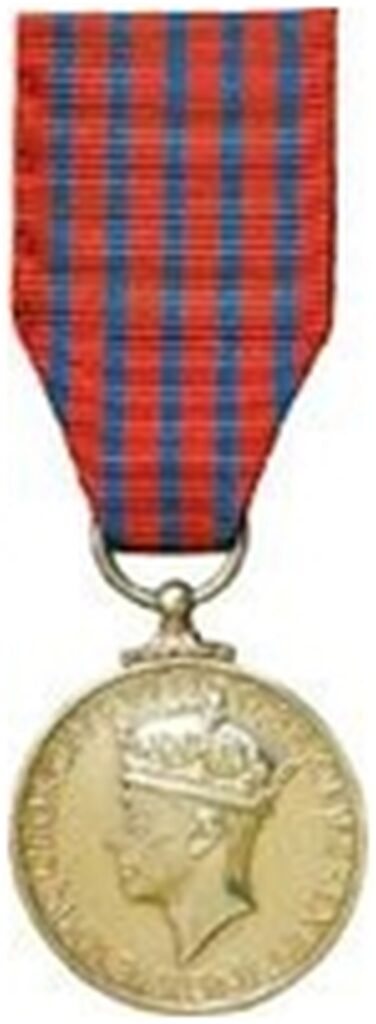The Shields Daily News published on 7th October 1942 had the dramatic headline:
“SHIELDS HEROES HONOURED“
It continued by recounting the story that two South Shields seamen had gone down with their vessel when it sank, having courageously decided to remain on its deck to tend the injured men after their ship had been torpedoed. The ship’s name was not mentioned in the article for wartime security reasons, but it was the steamship River Afton and it had been sunk on the 5th July 1942 by German submarine U-703.
Percy Grey was the ship’s Chief Steward and he was living at that time at 264 Edwards St in South Shields. First cook on board was Benjamin Coffey then of 65 Marshall Wallis Road.
The River Afton was part of Convoy PQ17 of 35 merchant ships to North Russia taking the Russian people essential supplies to aid them in their fight against the Nazis.
The first convoy set sail in August 1941 and by spring of 1942 twelve more convoys had completed the arduous voyage with the loss of only 1 ship out of 103.
Due to this success the Germans increased the strength of its navy in Norway and to prevent the vessels reaching Russian ports by moving the invincible battleship Tirpitz, Admiral Scheer and Admiral Hipper to Trondheim.

Convoy PQ17 sailed from Iceland on 27th June 1942 and their route was via the Barents Sea.
The convoy was located by the Germans on the 1st of July by U-Boat U-456 and from that day on the shipping was continuously attacked. On the 2nd July the convoy was attacked by 9 Bombers carrying torpedoes, one of which was shot down. One German plane managed to hit the SS Christopher Newport on the morning of the 4th of July and she was scuttled. That evening, 25 torpedo firing bombers attacked and sank the SS William Hooper. (American actor Douglas Fairbanks Jnr. was an officer on board the battleship USS Wichita also protecting the convoy)
The British First Sea Lord, Dudley Pound, who had been diagnosed with a brain tumour the year before, believed after receiving Swedish intelligence that the enemy navy including the Tirpitz were on their way to intercept the convoy and at 21H11 ordered the battleships and destroyers to leave the merchant ships by withdrawing westward and that the heavily loaded merchantmen in turn should scatter and proceed to Russian ports.
This meant that the vulnerable convoy was left unprotected. (Unfortunately the intelligence was interpreted wrongly in the Admiralty as further intelligence found the Tirpitz and its battlegroup was nowhere in the vicinity).
Commodore Dowding on the SS River Afton after seeing the messages was also convinced that the Tirpitz and its fleet were pursuing the convoy and urged the Chief Engineer to get more speed out of the ship’s engines with a promise of two cigars. The ship continued on her ‘scatter’ course to the north east and eventually they reached the ice fields and to make matters worse, the weather worsened and thick fog descended as she tried to head towards the coast of Noyava Zemlya. The River Afton like the other merchant ships was filled to capacity with supplies for Russia and her decks were packed with large crates, tanks and aircraft.
The destroyers moving westwards began to hear messages from the undefended merchant ships
“On fire in the ice”, “6 U-Boats approaching on the surface”, “Abandoning ship”.
All that was left to protect these heavily laden ships were corvettes, minesweepers and armed trawlers.
Constantly under attack from the air and submarine wolf packs, the seamen on board did as best they could without the benefit of military training. The attacks were to last for 48 hours and the explosives in the cargo made the ships beneath their feet into floating bombs.

Just after 10pm on the evening of the 5th July U-703 started its attack and the first torpedo struck the engine room of SS River Afton. Panic ensued as Captain Harold Charlton gave the order to abandon ship – precipitously in the opinion of Commodore Dowding as the ship was still seaworthy and they could radio for a ship to tow them. Dowding was well aware of the Russian necessity for the cargo with the Germans approaching Moscow and also the monetary value concerned and felt it wrong to abandon without a fight.
However Charlton still left the ship with some men on the ‘jolly boat’. The Royal Navy Signallers remained with Dowding as well as the ship’s radio officer who continued to transmit distress signals. Many of Charlton’s officers had ignored his order and were helping rescue men trapped below.
Ben Coffey of South Shields was on gun watch when one of the torpedoes hit the ship
“I was blown right out of the gun pit, but I managed to pick myself up all right. The second cook (Thomas Edward Waller aged 19 of Whitby) was in the engine room helping an injured engineer and I went to get a stretcher. Just then the third torpedo hit us. I tried to get a raft away for the injured, but before we could do anything the ship sank like a stone and I was carried down with it.”
The South African Engineer was 47 year old John Erskine Rudland Wood who was trapped in the flooding engine room with two broken legs. Waller had lowered himself with a rope through the engine room grating to put the injured man in a sling to raise him to the deck.
Percy Grey said
“The hero of our ship was a youth who was killed – Thomas Waller. He gave his own lifebelt to one of the crew who was hurt and afterwards went on to help another man. I saw him climb down into the shattered engine room and rescue one of the engineers and then go to another part of the ship. The last I saw of him was when he was standing near the point where the third torpedo hit us. I think he must have been killed by the explosion”.
Young Thomas was posthumously awarded the Lloyds War Medal for outstanding bravery.
In the meantime Commodore Dowding was on the Bridge hurriedly destroying his papers as well as those of Captain Charlton in case they fell into enemy hands. Then at 10:22pm Commander Heinz Bielfeld peering through the periscope of U-703 saw that the River Afton was still afloat and gave the order for the third torpedo to be fired.
Dowding shouted the order for the remaining rafts to be launched immediately. The ship started to roll and hatch covers were blown off by the force of the water surging into the old vessel and she started to slide after withstanding 2 torpedoes, into the icy depths. It was every man for himself as the ship and men who were still on board plunged into the inky darkness. That day the SS Pan Kraft, Washington, Carlton, Honomu, Empire Byron and SS Paulus Potter also sank and the Peter Kerr which was on fire was abandoned.

Percy’s work when the men were called to action stations was to care for any of the crew who might be injured and he was determined to carry out his duty whatever the cost. Many of the crew were killed by the explosions and Mr. Grey was helping an injured man onto a raft on the deck of the ship when the third torpedo struck.
“When this last torpedo hit us the ship tipped up on end and the raft was washed away. The vessel sank so quickly we had not time to do anything and were dragged under the water with the suction caused by it sinking. It seemed an eternity before I stopped going down, and it was only by struggling furiously that I finally reached the surface. When I looked around there was only the injured man and myself to be seen in the water. I could not swim but I had my lifebelt and by hanging on to an ammunition box I managed to paddle my way near to the injured man and I saw that he got picked up. Shortly afterwards the ammunition box sank, but I found a ship’s lifebuoy and kept afloat with this.
Benjamin Coffey of Marshall Wallis Street was in trouble as the ship dragged him down towards the sea bed.
“My lungs felt as though they were bursting and I thought I was going to lose consciousness but the boilers exploded and this helped me to reach the surface again. I had only learned to swim when I was 16, but I was jolly glad I did for it came in handy that night! I reached a raft which was about 25 yards away. I managed to get aboard then I saw the Commodore and helped him on too.”

The sea was filled with ship’s debris and men fighting desperately to stay alive.
Chief Steward Percy Grey was freezing in the icy waters
“We had been left behind by the convoy and a German submarine surfaced and asked us the name of our ship, our destination and our cargo. Some of the men shouted to the commander and asked him to take some of our injured men aboard. The German replied that he could not, that war was war. He gave a bottle of wine and a bottle of water to some men who were clinging to an upturned lifeboat and told us the direction in which to steer to the nearest land”
The submarine and its commander Heinz Bielfeld disappeared under the surface.

Percy struggled in the water about 30 minutes before he managed to get to a raft and climb on. His limbs must have been numb.
“It seemed as though I had been in the water for days, for we were in the far north regions and the sea was agonisingly cold. My feet were affected by being in the water so long and they still trouble me a little.”
Once on the raft he did not hold out much hope that it would be seen by any ship and none of the rafts had a compass or food on board and few paddles had survived the sinking, but miraculously after about four hours he was picked up! The Lotus spotted the smoke that Commodore Dowding had released as an SOS and approached the pitiful sight. Percy and some of the bedraggled survivors were landed in Russia and after recuperating he was put on board a convoy bound for England. It was not a voyage without incident as they were attacked incessantly by the enemy all the way home. Three more of the ship’s crew were killed returning to Britain. Chief Steward Grey at this date had been on two convoys to Russia and brushed aside the terrifying events he’d been through said
“They were only what were to be expected when going to sea”
An understatement if ever there was one!
Percy had been awarded the George Medal for his courageous actions that day and also the Lloyds War Medal. Until the outbreak of war he entertained himself on board ship by making ships in bottles
“You don’t get time for such things nowadays”
Fighting off enemy planes and U-Boats would have occupied every waking minute on these hazardous voyages!


Ben Thompson Coffey, born in Shields in 1917 and educated at Laygate Lane School had been at sea since he was 15 years old. He had been a gunner in the Merchant Navy and on one voyage helped to shoot down a German plane which was attacking his ship. He was awarded the Order of The Red Star by Russia for his gallantry on the River Afton. It was believed he was the first Englishman to receive it. It also included an annuity for the recipient and some privileges in Russia like a certain number of free railway journeys during the year. For his part Mr Coffey was extremely honoured and he said
“I would like to thank the Russian people for the kindness they had shown when I was landed in their country”.
Ben was congratulated by Rear Admiral Kharlamov, Naval attaché to the USSR Embassy.

In 1943 The Soviet Ambassador in London expressed the gratitude of his country to the men on the Arctic Convoys:
The Russian convoys are a Northern saga of heroism, bravery and endurance. This saga will live for ever, not only in the hearts of your people, but also in the hearts of the Soviet people, who rightly see in it one of the most striking expressions of collaboration between the Allied Governments, without which our common victory would have been impossible.
PQ17’s cargo was worth $700 million and included 300 aircraft, 600 tanks, 4000 lorries and trailers and a general cargo of more than 150,000 tons, enough to equip an army of 50,000. Only 11 of its 35 merchant ships survived the German attacks.
Between August 1941 and May 1945 78 convoys made this perilous journey carrying 4 million tons of supplies to the Soviets fighting the Nazis on the Eastern front. The total deliveries included 7,000 airplanes, 5,000 tanks, cars, fuel, medicines, outfits, metals and raw material.
Heinz Bielfeld of U-703 was killed in the Bay of Biscay on the 11 July 1944, he was 27.
Ben died on the 6th April 1953 whilst serving on the ship Daghestan in Natal, Brazil. At that time he was living at 19 Chichester Road, South Shields. He was 36 and had been married to Isabella for 13 years. They had 3 children.
Written and researched by Dorothy Ramser
